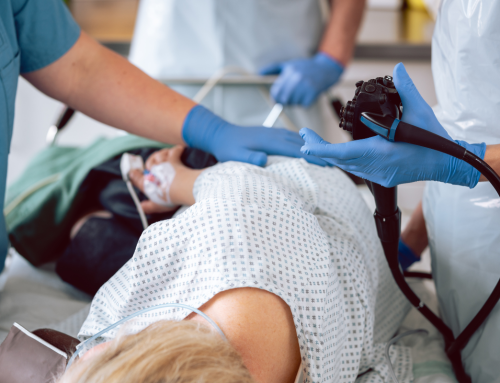 When it comes to colon cancer, 30 is the new 50.
When it comes to colon cancer, 30 is the new 50.
When people think of colon cancer, they often think of it as something that affects people older than the age of 50. That’s not necessarily the case anymore. Researchers predict that there will be roughly 97,000 new cases of colon cancer in 2018, and 43,000 new cases of rectal cancer. The most startling part? More than 13,500 of those people will be under the age of 50.
As the disease starts striking at younger ages, it is important to start recognizing it earlier. Arming yourself with the right information can keep you healthy and can even save your life.
Dr. O’Connor is here to answer your questions about colon health and give you information to help protect you from colon cancer. She was recently featured in a radio interview on SWAY in the Morning:
Let’s start with the basics of colon health.
Q: What is the colon?
A: The colon, also known as the large bowel or large intestine, is an organ that is part of the digestive system. The digestive system is the group of organs that allow us to eat and to use the food we eat to fuel our bodies, and the colon is the tube that allows us to eliminate waste from the food we consume.
Q: What exactly is the colon’s role in the digestive system?
A: All digestion begins in the mouth when you start chewing your food. The esophagus moves food from mouth to the stomach, where acids start breaking things down. After stomach juices break down food particles, things begin to move to the small intestine, which is where we absorb many of our vitamins, minerals, and nutrients. What is left over, which is mostly liquid, then moves into the colon (large intestine.)
The colon serves a very important role in the digestion process: it absorbs water, and maintains pH and electrolyte balance. Any leftover waste is moved through the colon to the rectum, which acts a storage system for the waste. Your muscles start to contract and move the waste (stool) out of your body through the anus.
Q: So, does my diet really affect my colon health and bathroom schedule that much?
A: When it comes to your daily poo schedule, your diet plays a pretty big role. It’s ideal to go one time per day, sometimes one time per every other day. Some people even go multiple times per day. But, if you aren’t properly hydrating and eating a healthy diet of fiber-rich foods, you will find yourself constipated and very uncomfortable. A diet well-balanced with fluids, fiber, fruits, and veggies is one of the best places to start for a healthy colon.
The average American gets only 16 grams of fiber per day, which is generally not enough to wash everything down and help with bodily functions. You should aim to get 25 to 35 grams of fiber per day. There are two different kinds of fiber that help keep things moving:
Insoluble fiber comes from foods that don’t absorb water, such as wheat bran, vegetables, and whole grains. This kind of fiber adds bulk to the stool and helps food pass more quickly through the stomach and intestines.
Soluble fiber attracts water and turns to gel during digestion, which slows the digestion process. Soluble fiber is found in oat bran, barley, nuts, seeds, beans, lentils, peas, and some fruits and vegetables.
It’s when we don’t take care of our colons that problems begin to arise.
Q: What is colon cancer?
A: Colorectal cancer, or colon cancer, occurs in the colon or rectum. Most colon cancers develop first as polyps, which are abnormal growths inside the colon or rectum that may later become cancerous if not removed.
Q: How common is colon cancer?
A: Excluding skin cancers, colon cancer is the third most common cancer diagnosed in both men and women in the United States. One in 20 people will be diagnosed with colon cancer in 2018.
Q: What kinds of things can contribute to colon cancer?
A: Many lifestyle-related factors have been linked to colon cancer. In fact, the links between diet, weight, and exercise, and colon cancer risk are some of the strongest for any type of cancer. Some of the factors you can change are:
- Being overweight or obese
- Consuming a lot of antibiotics and GMOs
- Lack of physical activity
- Diets that are high in saturated fat and low in fiber
- Smoking
- Alcohol consumption
Some factors, however, cannot be changed, such as:
- A personal history of colon polyps or colon cancer
- A personal history of inflammatory bowel disease
- A family history of colon cancer or adenomatous polyps
- Having an inherited syndrome, such as Lynch syndrome
Q: What are the symptoms of colon cancer?
A: Everyone’s normal is different, so you need to take note of what habits are normal for you. And, not all cases of colon cancer have signs and symptoms. Here are common issues that may appear to let you know something is wrong:
- Change in bowel habits – for example, if you’re not going as much as usual, or the size and/or color is different.
- Rectal bleeding
- Changed appetite and weight loss
- Abdominal pain
Q: Why is it important to get colon cancer screenings?
A: A startling 23 million people have not been screened for colon cancer. Routine screenings can prevent colorectal cancer – colonoscopies allow doctors to proactively remove growths in the colon and rectum before they can become cancerous. Still not convinced? Research shows that 60 percent of colon cancer deaths could be prevented with screening.
Q: What can I expect during a screening?
A: Before you are actually screened, you will have a consultation with your doctor where he or she will explain the entire process. Some people are afraid of the preparation process, but it is the most important part. You should follow instructions carefully to ensure that you are fully cleaned out in the case your doctor needs to remove any polyp.
You will be on a liquid diet for the entire day leading up to the screening — no solid food. You can consume clear liquids, such as apple juice, chicken broth, jello, and ginger ale. Some people even use liquid preps, mixing 6 fluid ounces of the prep liquid and 10 fluid ounces of water. Once it’s time for the screening, you will be completely asleep for the procedure, thanks to fast-acting anesthesia. A screening has minimal risks and the benefits clearly outweigh them.
Q: Do you recommend colonics?
A: Your body and its functions were made just the way they should be — if you are doing the right thing, you will cleanse your colon the natural way. The colon has natural good and bad bacteria that live together in equal amounts. A colonic can disrupt that equilibrium and patients can have significant problems.
There are hidden dangers with popular colonics. Some people do coffee ground enemas, which has caused rectum burning. Other people infuse water through a tube into rectum, which can cause accidental holes and perforations. In addition, you can experience a fluid overload that can lead to cardiac events, causing electrolyte abnormalities.
Q: When should I start getting screened?
A: There is a 95% survival rate if colon cancer is detected in its early stages, which means early screening can save your life. The incidence of colon cancer is decreasing amongst those who are 50 and older, but is increasing in those who are between 30 and 40 years old. The average Caucasian should be screened by the age of 50. African Americans should be screened by the age of 45 because they are often in more advanced stages when they are diagnosed.
Studies show that 25 percent of people diagnosed with colon cancer have a family history. If you have a family history of colon cancer, start getting screened earlier. For example, if your mom was diagnosed with colon cancer at the age of 45, you should have your first screening by the age of 35.
Your colon health is just as important as your overall health: if your colon is not healthy and properly functioning, then your body cannot do its job. Be proactive about your colon health and protect yourself from colon cancer. If you are unsure where to start, contact Dr. O’Connor to talk about your colon health and screening options.
Dr. Lynn M. O’Connor dedicates her practice to providing the foremost treatment, technology, and information related to preventive public health issues and colon and rectal health. An outstanding surgeon and health advocate, Dr. O’Connor is also the Director of the Women’s Colorectal Care Program for ProHEALTH Care Associates in the Greater New York City area. Click HERE to contact Dr. O’Connor’s office, or to schedule an appointment.
This blog provides general information and discussion about health, medicine, and related subjects. The content provided in this blog, and in any linked materials, are not intended and should not be construed as medical advice. If you have a medical concern, you should consult with a licensed physician or appropriate health care worker. If you think you may have a medical emergency, call your doctor immediately. The views expressed on this blog and website have no relation to those of any health care practice, hospital, or other institution with which the author is affiliated.




